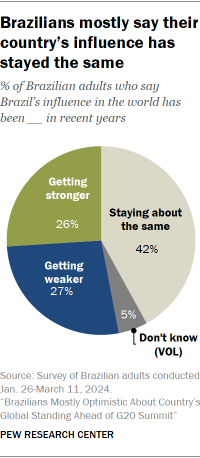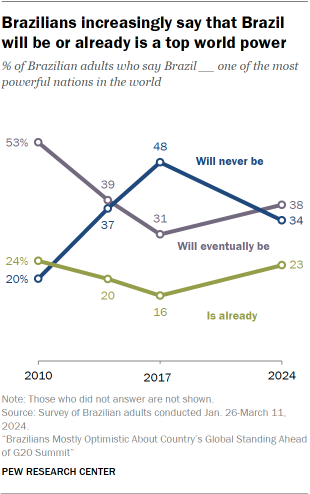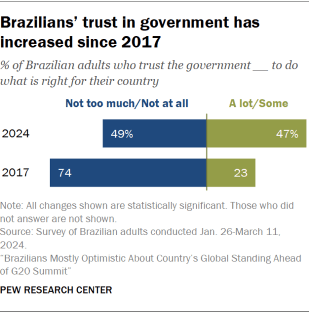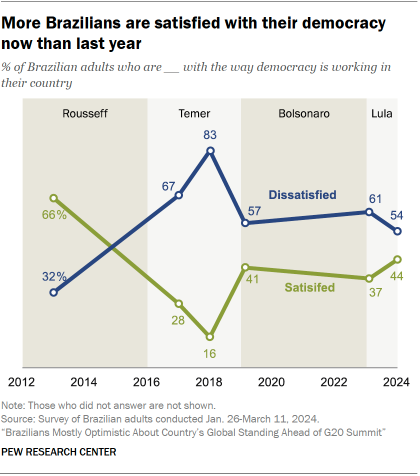Here are key takeaways about how Brazilians see their own country and its place in the world:
- 42% of Brazilian adults say Brazil’s global influence has stayed about the same in recent years. Roughly a quarter each believe their country is getting stronger (26%) or getting weaker (27%).
- About six-in-ten Brazilians say their country either will eventually be (38%) or already is (23%) one of the most powerful nations in the world. However, 34% say Brazil will never reach this status.
- Trust in the government to do what is right for the country is almost evenly divided: 49% do not trust their government to do what is right, while 47% do.
- More Brazilians are dissatisfied than satisfied with the way democracy is working in their country (54% vs. 44%). But satisfaction has improved since last year.
Brazil’s international standing
Brazilians generally say that Brazil’s influence is unchanged in recent years, but many think their country is or may eventually be one of the most powerful in the world.
Brazil’s influence in the world

When asked how Brazil’s standing on the world stage has fared in recent years, a plurality of Brazilians (42%) say their country’s global influence has stayed about the same. Roughly a quarter each believe that Brazil is getting stronger (26%) or that it is getting weaker (27%). Another 5% did not respond.
Opinion about Brazil’s influence in the world varies by support for the country’s left-leaning governing coalition, which includes Lula’s Worker’s Party (PT). (Read Appendix A for more information on how we classify governing parties.)
Brazilians who feel close to any of the governing parties are 15 percentage points more likely than those who don’t feel close to these parties to say Brazil’s influence has been getting stronger. Those who don’t feel close to any of the parties in power are much more likely than governing party supporters to say Brazil has been getting weaker.
Brazil’s status as a powerful nation
Brazilian adults are somewhat optimistic about their country’s status in the world: 38% say Brazil will eventually be one of the most powerful nations in the world, and 23% say it is already among the most powerful nations. About a third (34%) believe Brazil will never be a top power.

The share of Brazilians who say their country will never be one of the most powerful is 14 points lower now than it was in 2017, when we last asked this question.
But Brazilians today are more likely to say their country will never be one of the most powerful than they were in 2010, during Lula’s first presidential term. Then, just 20% believed Brazil would never be a top power, a share that has risen 14 points in the intervening years.
Optimism about Brazil’s international standing varies by education level. Brazilians with less than a secondary education are significantly more likely than those with more education to say that Brazil is currently one of the most powerful nations in the world (33% vs. 17%). For their part, those with more education are more likely than those with less to say their country will eventually be one of the most powerful in the world (42% vs. 31%).
Brazilians who do not feel close to the parties in power (37%) are more likely than those who do (26%) to say Brazil will never be one of the more powerful nations in the world. And those with higher incomes are more likely to hold this view when compared with those who have lower incomes (39% vs. 30%).
Brazil’s government and political system
Looking domestically, Brazilians have some reservations about how their government and political system are working.
Trust in government

Trust in the national government is about evenly divided, with 47% of Brazilians saying they trust the government to do what is right for the country and 49% saying they do not. This includes roughly four-in-ten (39%) who say they do not trust the government at all to do what is right for Brazil.
Although a substantial share has no trust in the government, trust has significantly improved since we last asked this question in 2017. The share of Brazilians who trust their government to do what is right has grown from 23% then to 47% today.
Brazilians who support parties in Lula’s governing coalition are far more likely than those who do not to trust the government (73% vs. 38%). Views also vary by ideology: Those who place themselves on the left are the most likely to say they trust the government to do the right thing (68%), followed by smaller shares of those in the center (51%) and on the right (39%).
White Brazilians are more skeptical of their government than Black or mixed-race Brazilians are. About a third of White Brazilians (36%) say they trust the national government to do what is right for Brazil, while around half or more among Black Brazilians (57%) and mixed-race Brazilians (51%) say the same. (White Brazilians are also less likely to support the governing parties.)
Those with higher incomes also express less trust than those with lower incomes (40% vs. 54%) and are also more likely to answer the question.
Satisfaction with democracy

When thinking about how democracy is working in their country, Brazilians are somewhat dissatisfied. Slightly more than half express dissatisfaction, including 30% who are not at all satisfied.
While evaluations of democracy in Brazil are more negative than positive, they have improved since last year. Satisfaction levels have risen 7 points since 2023.
Related: Satisfaction with democracy has declined in recent years in high-income nations.
Satisfaction with the way democracy is working in Brazil varies by race. Roughly half of Black and mixed-race Brazilians express satisfaction with the system (48% each), compared with 37% of White Brazilians.
Additionally, those on the ideological left are more likely than those on the right to say they are satisfied (56% vs. 35%). And Brazilians who support the governing parties are 25 points more likely than those who don’t to be satisfied with their democracy.
We observed a similar pattern during the administration of Jair Bolsonaro, a right-wing politician who held office from 2019 to 2023. In the first year of his term, Brazilians on the ideological right expressed more satisfaction with their democracy than those on the left (47% vs. 29%). And those who supported the parties in Bolsonaro’s government were more satisfied than those who did not (56% vs. 38%).




